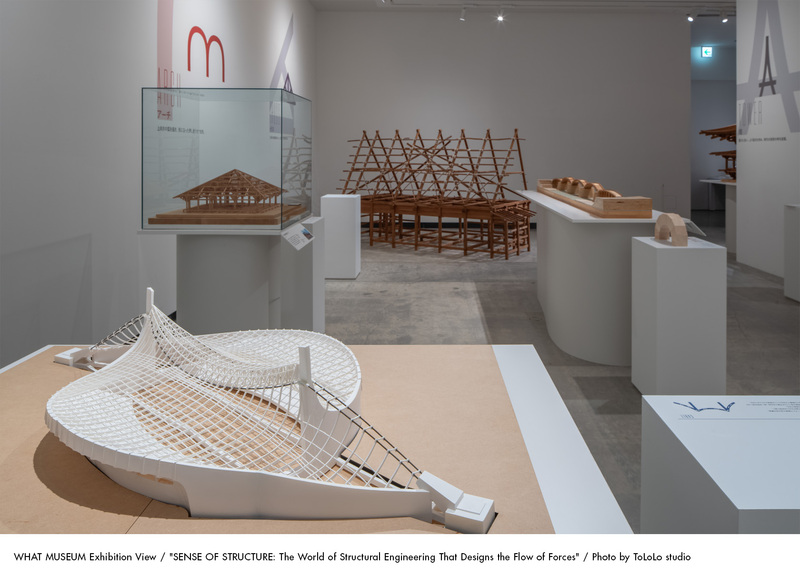This year marks 100 years since the Great Kanto Earthquake of 1923. We humans have lived in a gravitational space called the Earth, a world subject to seismic force, wind force, and other natural forces. How have we designed the flow of forces in architecture on this planet? In the world of structural design, structural engineers have been working diligently with such flow of forces and materials and leveraging technologies to create structures that constitute building frameworks. Collaboration between architects and structural engineers has yielded numerous masterpieces of architecture. However, there are few opportunities to learn more about structural engineers and structures. Structural engineers earnestly delve into mathematics, dynamics, and natural science, accumulate numerous calculations, experiments, and experience, and eventually develop a sense and sensibility for the flow of forces within themselves.



WHAT MUSEUM organized an exhibition to cultivate a deeper understanding of structural design through the physical experience of architectural models. In this exhibition, visitors can experience the creative possibilities of structural design and its philosophy through models. Also, visitors are encouraged to perceive architectural structures through their senses and think about the flow of forces in this world through their sensibilities. The exhibition consists of three themed sections and an overview section, where visitors can view over forty structural models. The themed sections feature structural engineer Mutsuro Sasaki’s collaboration with architects Arata Isozaki, Toyo Ito, and Kazuyo Sejima + Ryue Nishizawa/SANAA, Lunar Base Camp under joint development by JAXA (Japanese Aerospace Exploration Agency) and structural engineer Jun Sato and his team, and models of architectural works using bamboo, which is a sustainable building material attracting attention recently. The overview section allows visitors to perceive the flow of forces in architecture through their senses using structural models of well-known architectural masterpieces from ancient times to the present.
In the spring of 2024, WHAT MUSEUM will present the second half of the exhibition, “SENSE OF STRUCTURE: From Horyuji Temple to the Universe,” in which we will continue our year-long efforts to disseminate the fascinating world of architectural structures.
[Overview of the Exhibition]

Title: SENSE OF STRUCTURE: The World of Structural Engineering That Designs the Flow of Forces
Dates: September 30th (Sat), 2023 – February 25th (Sun), 2024 (as the first term of the SENSE OF STRUCTURE exhibition)
* The second term “SENSE OF STRUCTURE: From Horyuji Temple to the Universe” will be held in the spring of 2024.
Venue: WHAT MUSEUM 1F (Warehouse TERRADA G Building 2-6-10 Higashi-Shinagawa, Shinagawa-ku, Tokyo 140-0002)
Open Hours: Tuesday – Sunday, 11:00 AM – 6:00 PM (Admission until 5:00 PM)
Closed on: Mondays (but open when Monday is a public holiday, then closed the following Tuesday), and New Year’s holidays
Admission: Adults 1,500 yen / University or vocational college students 800 yen / Students under high school age Free
* Including the admission for the concurrent exhibition “The lens within your heart” from the TAKEUCHI COLLECTION
* Advance reservation by online ticketing is available
* Re-entry ticket valid during the exhibition are on sale
Exhibition Passport 2,500 yen (This exhibition and its concurrent exhibition are available)
* WHAT MUSEUM’s ARCHI-DEPOT stores more than 600 architectural models, which architects and architectural firms entrust to us, and exhibits a part of them for visitors.
Price: Admission for ARCHI-DEPOT 700 yen / Admission including both the exhibition and ARCHI-DEPOT 2,000 yen
Organizing: WHAT MUSEUM
Planning: WHAT MUSEUM ARCHI-DEPOT
Cooperation: Motoshi Inukai, Yohei Tomioka, Hiroshi Yoshino Architects
Exhibition Graphics: Kensuke Sakakibara
Key Visual Design: Kohei Sekigawa
Video Production: Kenji Seo
Model-making Collaboration: Lambda Digital Engineering, Nichinan Corporation, Ueno Sekkoumokei Seisakusho Co.Ltd
Components Production Collaboration: Takemoku Co., Ltd.
URL: https://what.warehouseofart.org/en/exhibitions/sense-of-structure_first-term_en
[Exhibited Works (partially)]
Model of ANABUKI ARENA KAGAWA (Kagawa Prefectural Arena) (Collection of Kazuyo Sejima + Ryue Nishizawa/SANAA) / Model of a House that belonged to the Tajima Family, a Gassho Architectural Style in Shirakawa-go (Collection of Shirakawa Village Educational Committee) / Model of Jodoji Temple (Collection of The University Museum, The University of Tokyo) / Model of Yakushiji Temple West Pagoda (Collection of Chie Matsuo Laboratory, School of Architecture, Meisei University) / Model of Kintaikyo Bridge (Collection of Mikio Koshihara Laboratory, Institute of Industrial Science, The University of Tokyo) / Model of Pantheon (Collection of Department of Architecture and Building Engineering, Faculty of Engineering, Tokai University) / Model of Restaurant in Xochimilco / Model of Teshima Art Museum (Collection of Office of Ryue Nishizawa) / Model of Yoyogi National Stadium / Model of Tokyo Skytree (Collection of Tokyo Skytree(R)) / Model of New Florence Train Station (competition proposal) / Model of Sendai Mediatheque (Collection of Sasaki Structural Consultants) / Model of Meisou no mori (Forest of Meditation) Municipal Funeral Hall (Collection of Sasaki Structural Consultants) / Model of Tama Art University Library (Hachioji campus) (Collection of Toyo Ito & Associates, Architects)
* A part of the exhibits will be replaced during the exhibition
[Exhibition Collaborators]
Arata Isozaki & Associates / Toyo Ito & Associates, Architects / Park and Masudome Laboratory, Department of Architecture, Faculty of Engineering, Kagoshima University. / NIKKEN SEKKEI LTD / Kitagata Community Center / Takayuki Kiuchi / Kazuya Saito Laboratory, Kyushu University, Faculty of Design / Sasaki Structural Consultants / Kazuyo Sejima + Ryue Nishizawa/SANAA / Hirokazu Toki Laboratory, The University of Shiga Prefecture / Shirakawa Village Educational Committee / Taiyo Kogyo Corporation / Tama Art University, Department of Architecture and Environmental Design / Department of Architecture and Building Engineering, Faculty of Engineering, Tokai University / Tokyo Skytree(R) / Mikio Koshihara Laboratory, Institute of Industrial Science, The University of Tokyo / The University Museum, The University of Tokyo / Jun Sato Laboratory, Graduate School of Frontier Sciences, The University of Tokyo + Jun Sato Structural Engineers Co., Ltd. / Office of Ryue Nishizawa / Chie Matsuo Laboratory, School of Architecture, Meisei University
[Highlights]
– First public presentation of a 1/10 scale model of Lunar Base Camp for a long-term human presence on the Moon
– Exhibiting over forty structural models of well-known architectural masterpieces from ancient times to the present
– Architectural works created through the collaboration between structural engineer Mutsuro Sasaki and architects Arata Isozaki, Toyo Ito, and Kazuyo Sejima + Ryue Nishizawa/SANAA
– Architectural works and full-scale mockup models using bamboo, which open up new possibilities for the sustainable material
– Map of structural masterpieces in’Japan’s forty-seven prefectures
– Structural models allowing visitors to touch and physically experience
[Four sections of the exhibition]
Theme A: Collaboration between a structural engineer and architects
This section focuses on the collaboration between structural engineer Mutsuro Sasaki and architects Arata Isozaki, Toyo Ito, and Kazuyo Sejima + Ryue Nishizawa/SANAA.


Theme B: Into outer space
This section introduces efforts to expand the structural design of architecture on the Earth to outer space. Lunar Base Camp for a long-term human presence on the Moon, under joint development by structural engineer Jun Sato and his team and JAXA, is on display.

Theme C: Material and Structure
The exploration of building materials and structural design are closely interrelated. This section highlights bamboo as a sustainable building material and presents new possibilities for architectural spaces using bamboo.

Theme D: Flow of forces in architecture
Structural models of well-known architectural masterpieces from ancient times to the present day are on display. Visitors can perceive the flow of forces in architecture through their senses.

[Audio Guides]
By downloading the official WHAT MUSEUM app, visitors can use the audio guide. (Free)
Descriptions of highlights of the exhibition and structure models will be available.
[Concurrent Exhibition]
“The lens within your heart” from the TAKEUCHI COLLECTION
Dates: September 30th (Sat), 2023 – February 25th (Sun), 2024
URL: https://what.warehouseofart.org/en/exhibitions/takeuchi-collection_en
[ARCHI-DEPOT YouTube Channel]
Interviews with architects and structural engineers, as well as those who have been using our architectural model storage, are available, along with archived videos of previous events. Interviews related to this exhibition will also be uploaded.
ARCHI-DEPOT YouTube channel: https://www.youtube.com/c/archidepotmuseum
[About WHAT MUSEUM] https://what.warehouseofart.org/en
WHAT MUSEUM, collectors‘ museum of contemporary art, opened in Tennoz, Tokyo in December 2020. The Museum’s core work is to make the precious works of art properties that collectors and artists have entrusted to us accessible to the public. We have used our unique insight as a warehousing company to explore the concept of what an art facility should be. The result is to open up the warehouse to offer the public a look at art that they would not ordinarily have the opportunity to see. The museum exhibits works by artists active in the contemporary art scene side-by-side with the thoughts of the collectors as well as the artists, offering an innovative space for the appreciation of art. The name of WHAT (WAREHOUSE OF ART TERRADA) implies the cultural value which is gleaming quietly in the warehouse, and the museum exhibits two- and three-dimensional works as well as architectural models, photographs, movies, literature and installations. We plan and exhibit these diversified arts and cultures in our individual style of a museum as a warehouse company in new and unique approaches.
[About ARCHI-DEPOT]
WHAT MUSEUM’s ARCHI-DEPOT stores more than 600 architectural models, which architects and architectural firms entrust to us, and exhibits a part of them for visitors. These architectural models from renowned architects and design firms that we store and display can be viewed in a warehouse setting.
[About Warehouse TERRADA]
Established in 1950 and located in Tennoz, Tokyo, Warehouse TERRADA has since expanded into a wide range of fields, with a primary focus on the storage of artworks, which launched in 1975, as well as artwork restoration, transportation, and exhibitions. In 2014, we began operating a bonded warehouse for artworks. We established a new bonded warehouse in the spring of 2022, which we opened as a permanent bonded gallery venue that allows for viewings, storage and more under bonded conditions. We offer foreign and domestic art collectors opportunities to purchase artworks and give overseas galleries a chance to expand their presence in Japan. We also operate art studios that are available for rent as well as hosting the ART AWARD, supporting younger artists. These initiatives earned us the Montblanc de la Culture Arts Patronage Award in 2018. In recent years, Warehouse TERRADA has opened several facilities that promote art and culture, including the collectors’ museum of contemporary art “WHAT MUSEUM”, art gallery cafe “WHAT CAFE”, art materials lab “PIGMENT TOKYO” and TERRADA ART COMPLEX, one of Japan’s largest gallery complexes. Through these broad-ranging art industry operations, and as a leading company in the Japanese art world, we provide services that will play a role in revitalizing its art market and develop Tennoz, Tokyo, as a hub of art together with other cities around the world.
Company name: Warehouse TERRADA
Representative: President & CEO, Kohei Terada
Address: 2-6-10 Higashi-Shinagawa, Shinagawa-ku, Tokyo
Foundation: October 1950
URL: https://www.terrada.co.jp/en
[Contact]
Inquiries for the Exhibition and the facility
Warehouse TERRADA WHAT MUSEUM Team E-MAIL: info.what@terrada.co.jp



